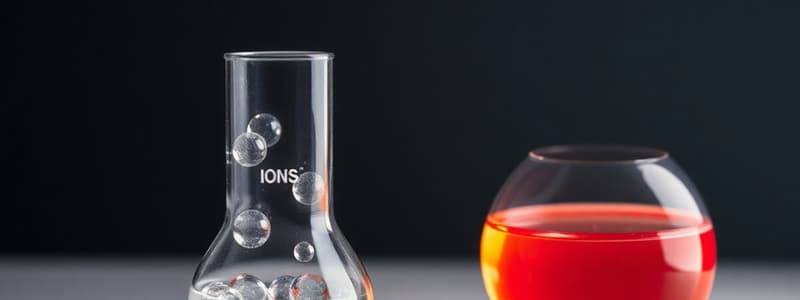Podcast
Questions and Answers
If an atom loses an electron, it becomes:
If an atom loses an electron, it becomes:
- A cation, carrying a positive charge. (correct)
- An isotope, with a different atomic mass.
- A neutron, carrying no charge.
- An anion, carrying a negative charge.
Which subatomic particles are located in the atomic nucleus?
Which subatomic particles are located in the atomic nucleus?
- Electrons and ions
- Protons and neutrons (correct)
- Protons and electrons
- Neutrons and electrons
What distinguishes an anion from a cation?
What distinguishes an anion from a cation?
- Anions have more protons than electrons, while cations have more electrons than protons.
- Anions are neutral particles found in the nucleus, while cations are charged particles orbiting the nucleus.
- Anions are negatively charged due to electron gain, while cations are positively charged due to electron loss. (correct)
- Anions are positively charged due to electron loss, while cations are negatively charged due to electron gain.
Which of the following best describes an electrolyte?
Which of the following best describes an electrolyte?
How does a chemical compound differ from a single element?
How does a chemical compound differ from a single element?
Flashcards
What is matter?
What is matter?
Anything that has mass and takes up space; exists as solid, liquid, or gas.
What are chemical compounds?
What are chemical compounds?
Substances made of two or more elements chemically bonded.
What is an atom?
What is an atom?
The smallest unit of an element that retains its chemical properties.
What is the atomic nucleus?
What is the atomic nucleus?
Signup and view all the flashcards
What are ions?
What are ions?
Signup and view all the flashcards
Study Notes
- Matter occupies space, possesses mass, and exists as a solid, liquid, or gas.
- Elements compose all matter.
- Chemical compounds result from the combination of elements.
- Atoms represent the smallest unit of an element.
- The atomic nucleus contains protons and neutrons.
- Protons are positively charged particles.
- Neutrons are particles without any electrical charge.
- Electrons are negatively charged particles.
- Ions are electrically charged atoms, molecules, or particles.
Cations
- Cations have a positive charge because of electron loss.
Anions
- Anions possess a negative charge due to electron gain.
Electrolyte
- An electrolyte contains free ions within a solvent.
Studying That Suits You
Use AI to generate personalized quizzes and flashcards to suit your learning preferences.




